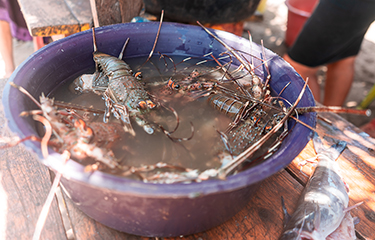The spiny lobster (Panulirus argus) fishery in Nicaragua has completed its fishery improvement project (FIP) and entered the full assessment process for Marine Stewardship Council (MSC) certification.
The Caribbean-based fishery is the largest supplier of spiny lobster to the U.S., and the country exported seafood worth USD 180 million (EUR 170 million) in the first six months of 2022. Nicaragua is the second major Caribbean spiny lobster fishery to enter the process, after the Bahamas achieved certification in 2018.
The main issue the fishery faces as it attempts to gain MSC certification is the presence of illegal, unreported, and unregulated fishing (IUU), which weakens resource management and hampers equitable access for thousands of Nicaraguans that make a living in the fishery. In a normal year, the country exports 2,000 metric tons of spiny lobster worth USD 40 million (EUR 37 million).
Other issues facing the fishery covered under the FIP include a lack of new or improved data from the artisanal fishing sector, which reduces information on stock status, bycatch, and the habitat impacts of lobster traps.
Another uncertainty jeopardizing MSC certification of the fishery the fact the spiny lobster fishery in Nicaragua is shared with Honduras, and the evaluation needs to consider both countries in order to achieve an unconditional pass under the MSC standard.
However, the fishery has achieved multiple goals under the FIP, including completing the first-ever bi-national (Honduras-Nicaragua) stock assessment to determine the health of the shared lobster stock; establishing the Bi-National Spiny Lobster Working Group to ensure robust data collection; improving fishery data in Nicaragua to include the composition of the artisanal fleet, fishing effort, landings, and estimates of IUU fishing; and working with the Nicaraguan government to adopt a lobster management plan, which was updated with input from fishing communities and included measures to address IUU fishing, with a the next update of the plan due March 2023.
Stakeholders in the FIP, which was led by WWF and the Nicaraguan Institute for Fisheries and Aquaculture, included Arista Industries, Costco Wholesale, Darik Enterprises, Hyatt Corporation, Red Lobster, Sysco Corporation, Tequesta Bay Foods, and The Kroger Co.
The push for MSC certification of the fishery comes soon after Nicaragua signed a new agreement with China that will allow imports, including seafood, to enter China duty-free. Beijing promised the trade deal in return for Nicaragua switching diplomatic recognition from Taiwan in December 2021.
Photo courtesy of cfalvarez/Shutterstock







